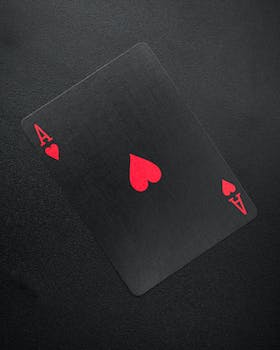
Blackjack and poker are two popular card games that have captivated players for decades. Both games require skill, strategy, and a bit of luck. However, when it comes to the odds of winning, there are some key differences between the two. In this article, we will compare the odds of blackjack and poker to determine which card game offers better chances of success.
The Differences in Rules and Gameplay Between Blackjack and Poker
Blackjack and poker are two of the most popular card games played in casinos around the world. While both games involve skill and strategy, they have distinct differences in rules and gameplay. Understanding these differences can help players decide which game offers better odds and suits their preferences.
Let’s start with blackjack. In this game, the objective is to have a hand value closer to 21 than the dealer’s hand, without going over. Each player is dealt two cards, and they can choose to hit (receive another card) or stand (keep their current hand). The dealer also receives two cards, but one of them is face down. The value of the cards is straightforward: numbered cards are worth their face value, face cards (King, Queen, and Jack) are worth 10, and Aces can be worth either 1 or 11, depending on the player’s choice.
Poker, on the other hand, is a game where players compete against each other, rather than the dealer. The objective is to have the best hand among all the players or to bluff your opponents into folding. Each player is dealt a certain number of cards, depending on the variation of poker being played. They can then bet, raise, or fold, based on the strength of their hand and their confidence in winning the round. The ranking of hands in poker is crucial to understand, as it determines the winner of each round.
One significant difference between blackjack and poker is the element of luck versus skill. While both games require a certain level of skill, blackjack is more reliant on luck. Players have limited control over the cards they are dealt and must make decisions based on probability and intuition. In contrast, poker involves a higher level of skill, as players must analyze their opponents’ behavior, make strategic bets, and bluff effectively. The ability to read other players and make calculated decisions is crucial in poker.
Another difference lies in the house edge and odds of winning. In blackjack, the house edge is relatively low, usually around 1%. This means that, on average, players can expect to lose $1 for every $100 they wager. The odds of winning a hand in blackjack are also favorable, with a roughly 42% chance of winning, assuming optimal strategy. However, in poker, the house does not have a direct edge, as players compete against each other. The odds of winning in poker depend on various factors, such as the skill level of opponents and the strength of one’s hand. Skilled players can have a significant advantage in poker, making it a game where the odds can be more favorable with experience and expertise.
In conclusion, blackjack and poker are both exciting card games with their own set of rules and gameplay. Blackjack is a game of luck and probability, where players aim to have a hand value closer to 21 than the dealer’s hand. Poker, on the other hand, is a game of skill and strategy, where players compete against each other to have the best hand or bluff their opponents. The house edge and odds of winning also differ between the two games, with blackjack offering a lower house edge and more favorable odds. Ultimately, the choice between blackjack and poker depends on personal preference and the level of skill and strategy one is willing to employ.
Analyzing the Odds: Which Game Offers Better Chances of Winning, Blackjack or Poker?
Blackjack and poker are two of the most popular card games played in casinos around the world. Both games require skill and strategy, but they also offer different odds of winning. In this article, we will analyze the odds of winning in blackjack and poker to determine which game offers better chances of success.
Let’s start by looking at blackjack. In this game, the objective is to have a hand that is closer to 21 than the dealer’s hand, without going over. The odds of winning in blackjack depend on several factors, including the number of decks being used and the specific rules of the casino. Generally, the house edge in blackjack is around 0.5%, which means that the casino has a slight advantage over the player. However, skilled players who understand basic strategy can reduce the house edge even further, sometimes to as low as 0.1%. This means that if you play blackjack with optimal strategy, you have a good chance of winning more often than losing.
On the other hand, poker is a game where players compete against each other, rather than against the house. The odds of winning in poker depend on various factors, such as the skill level of the players at the table and the specific variant being played. In games like Texas Hold’em, the odds of winning a hand can be calculated based on the number of outs (cards that can improve your hand) and the number of cards remaining in the deck. Skilled poker players are able to calculate these odds and make informed decisions based on them. However, since poker is a game of skill, the odds of winning can vary greatly depending on the players involved. In a game with highly skilled opponents, the odds of winning may be lower compared to a game with less experienced players.
When comparing the odds of winning in blackjack and poker, it is important to consider the element of luck. In blackjack, the outcome of each hand is determined by the cards that are dealt, which means that luck plays a significant role. In poker, luck also plays a part, as the cards that are dealt are random. However, skilled players are able to use their knowledge and strategy to overcome bad luck and make profitable decisions in the long run.
In conclusion, both blackjack and poker offer different odds of winning. In blackjack, the house edge is relatively low, especially for players who use optimal strategy. On the other hand, poker is a game of skill, where the odds of winning depend on the players’ abilities and decisions. Ultimately, the choice between blackjack and poker depends on personal preference and the level of skill and strategy that a player is willing to invest. Whether you prefer the challenge of outsmarting opponents in poker or the thrill of trying to beat the dealer in blackjack, both games offer exciting opportunities to test your luck and skill at the card table.
Strategies and Techniques: Maximizing Your Success in Blackjack and Poker

Blackjack and poker are two of the most popular card games in the world, and both offer the thrill of gambling and the opportunity to win big. However, when it comes to maximizing your success in these games, it’s important to understand the strategies and techniques that can give you an edge. In this article, we will explore the odds of winning in blackjack and poker, and discuss the strategies that can help you increase your chances of success.
When it comes to odds, blackjack is often considered to be the game with the best chances of winning. In blackjack, the goal is to get a hand that is as close to 21 as possible without going over. The dealer also plays against the players, and the one with the hand closest to 21 wins. The odds in blackjack are based on mathematical probabilities, and by using basic strategy, players can reduce the house edge to as low as 0.5%. This means that for every $100 you bet, you can expect to lose only 50 cents on average. However, it’s important to note that these odds are based on playing with perfect strategy, and any deviation from this strategy can increase the house edge.
On the other hand, poker is a game of skill and strategy, and the odds of winning can vary greatly depending on the player’s skill level and the quality of their opponents. Unlike blackjack, where the odds are fixed, poker involves playing against other players, and the outcome of the game is determined by the players’ decisions and actions. This means that even if you have a strong hand, you can still lose if your opponents have a better hand or if they bluff you into folding. The odds in poker are not as straightforward as in blackjack, and they can change with every hand and every decision made at the table.
To maximize your success in blackjack, it’s important to learn and master basic strategy. This involves memorizing a set of rules that tell you the best move to make in every possible situation. By following basic strategy, you can make the most statistically advantageous decisions and reduce the house edge to its minimum. Additionally, it’s important to manage your bankroll and set limits on how much you are willing to bet. This will help you avoid chasing losses and making impulsive decisions that can lead to bigger losses.
In poker, the key to success lies in understanding the game and your opponents. It’s important to study the different poker strategies and learn how to read your opponents’ tells and betting patterns. By observing their behavior and making educated guesses about their hand, you can make better decisions and increase your chances of winning. Additionally, it’s important to manage your emotions and avoid going on tilt, which is when you let your emotions dictate your decisions. Staying calm and focused is crucial in poker, as it allows you to make rational decisions based on the information available.
In conclusion, both blackjack and poker offer the opportunity to win big, but they require different strategies and techniques to maximize your success. Blackjack offers better odds, but only if you play with perfect strategy. Poker, on the other hand, requires skill and the ability to read your opponents. By understanding the odds and implementing the right strategies, you can increase your chances of success in both games. So whether you prefer the simplicity of blackjack or the complexity of poker, remember to play smart and enjoy the thrill of the game.
The Psychological Aspects of Blackjack and Poker: How They Impact Your Gameplay
When it comes to card games, blackjack and poker are two of the most popular choices. Both games require skill, strategy, and a bit of luck. However, they differ in many ways, including the psychological aspects that can impact your gameplay. Understanding these psychological factors can help you make better decisions and improve your chances of winning.
In blackjack, the objective is to get a hand with a total value as close to 21 as possible without going over. The game is played against the dealer, and each player competes individually. One of the psychological aspects that come into play in blackjack is the fear of busting. Players often feel the pressure to make the right decision, as going over 21 means an automatic loss. This fear can lead to conservative play, where players are hesitant to take risks and may not maximize their potential winnings.
On the other hand, poker is a game of skill and strategy, where players compete against each other. The objective is to have the best hand or to convince other players to fold. In poker, the psychological aspect of bluffing plays a significant role. Players must be able to read their opponents’ body language and behavior to determine if they are bluffing or have a strong hand. This requires a keen sense of observation and the ability to control one’s emotions. The psychological aspect of poker adds an element of excitement and unpredictability to the game.
Another psychological aspect that affects both blackjack and poker is the concept of risk-reward. In blackjack, players must decide whether to hit or stand based on the value of their hand and the dealer’s upcard. This decision involves weighing the potential reward of improving their hand against the risk of going over 21. Similarly, in poker, players must decide whether to bet, call, raise, or fold based on the strength of their hand and the potential reward of winning the pot. Understanding the concept of risk-reward is crucial in both games, as it can help players make informed decisions and increase their chances of success.
Furthermore, both blackjack and poker require players to manage their bankroll effectively. This involves setting limits, knowing when to stop, and not letting emotions dictate their actions. In blackjack, players must decide how much to bet on each hand, taking into account their bankroll and the table limits. In poker, players must manage their chips and make strategic bets to maximize their winnings. The psychological aspect of bankroll management is essential in both games, as it can help players avoid unnecessary losses and maintain a sustainable playing strategy.
In conclusion, the psychological aspects of blackjack and poker have a significant impact on gameplay. Understanding these factors can help players make better decisions, improve their strategies, and increase their chances of winning. Whether it’s the fear of busting in blackjack or the art of bluffing in poker, these psychological elements add depth and excitement to the games. So, whether you prefer the fast-paced action of blackjack or the strategic gameplay of poker, both card games offer unique psychological challenges that can enhance your overall gaming experience.
Exploring the Pros and Cons of Blackjack and Poker: Which Game is Right for You?
Blackjack and poker are two of the most popular card games in the world. Both games require skill, strategy, and a bit of luck. However, when it comes to the odds of winning, there are some key differences between the two. In this article, we will explore the pros and cons of blackjack and poker, helping you decide which game is right for you.
Let’s start with blackjack. This game is played against the dealer, and the goal is to have a hand that is closer to 21 than the dealer’s hand, without going over. One of the biggest advantages of blackjack is that it offers some of the best odds in the casino. The house edge in blackjack is typically around 0.5%, which means that for every $100 you bet, you can expect to lose only 50 cents on average. This low house edge makes blackjack a favorite among gamblers who are looking to maximize their chances of winning.
Another advantage of blackjack is that it is a relatively simple game to learn and play. The basic strategy for blackjack can be easily memorized, and with a little practice, you can become a skilled player. This simplicity is appealing to many players who prefer a straightforward and easy-to-understand game.
On the other hand, poker is a more complex game that requires a deeper understanding of strategy and psychology. Unlike blackjack, poker is played against other players, and the goal is to have the best hand at the table. The odds of winning in poker can vary greatly depending on the skill level of your opponents. If you are playing against experienced players, the odds may not be in your favor. However, if you are playing against less skilled players, you may have a better chance of winning.
One of the advantages of poker is that it offers the opportunity for long-term profitability. Skilled poker players can consistently make money over time by exploiting the mistakes and weaknesses of their opponents. This is known as “playing the player” rather than playing the cards. In poker, your success is not solely dependent on the cards you are dealt, but also on your ability to read your opponents and make strategic decisions based on their behavior.
However, it is important to note that poker also has a higher level of variance compared to blackjack. Variance refers to the ups and downs in your bankroll that are inherent in any form of gambling. In poker, you can experience long periods of losing before hitting a big win. This can be frustrating for some players who prefer a more consistent and predictable game like blackjack.
In conclusion, both blackjack and poker offer unique advantages and disadvantages. Blackjack has better odds and is easier to learn, making it a great choice for beginners or those who prefer a simpler game. On the other hand, poker offers the opportunity for long-term profitability and a more complex and strategic gameplay experience. Ultimately, the choice between blackjack and poker comes down to personal preference and what you are looking for in a card game. So, whether you prefer the thrill of blackjack or the challenge of poker, both games can provide hours of entertainment and the chance to win big.In conclusion, the odds in blackjack are generally more favorable compared to poker.
 Skip to content
Skip to content





